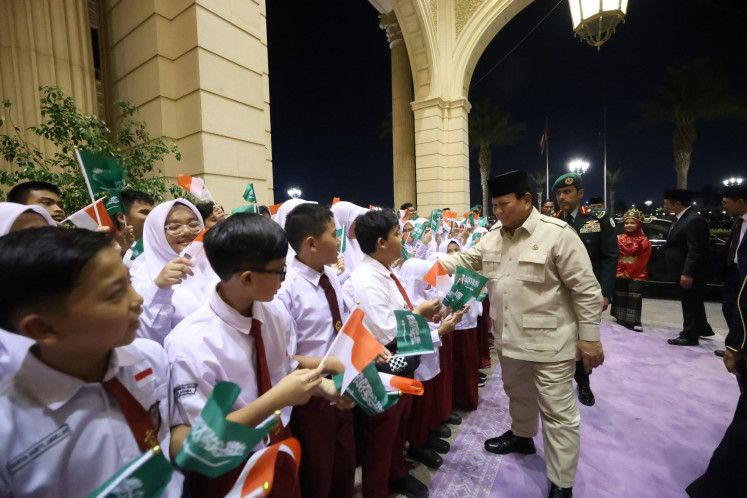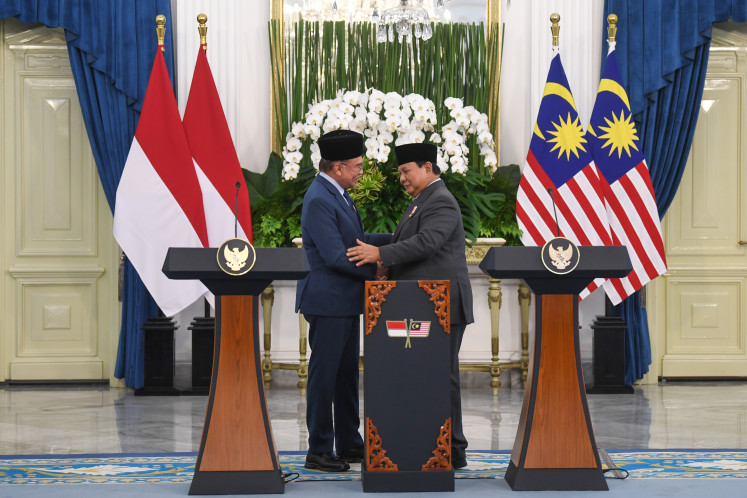Popular Reads
Top Results
Can't find what you're looking for?
View all search resultsPopular Reads
Top Results
Can't find what you're looking for?
View all search resultsView point: When the pharaoh phalls
I will never forget visiting Egypt in 1994
Change text size
Gift Premium Articles
to Anyone

I will never forget visiting Egypt in 1994. To set foot on the land of one of the oldest civilizations was a childhood dream come true.
As I stood before the majestic pyramids of Giza with the enigmatic, crumbling Sphinx nearby, I felt transported to the ancient land of Moses and the Pharaohs.
Seventeen years later, reading about the turbulent anti-Mubarak demonstrations in Cairo, I was transported not to ancient Egypt, but to the streets of Jakarta in 1998. Rioting erupted before Soeharto, the authoritarian general who ruled us for 32 years, stepped down.
It was a familiar scene: A des-potic ruler facing massive popular protests. The situation in Jakarta then was nerve-wracking, with violence, international pressure, unexpected turns of events and an uncertain outcome. Now it’s happening in Cairo.
Like Soeharto, who conceded that it would be “difficult to carry out [his] duty as the country’s ruler”, Mubarak, who has also ruled for three decades, admitted in an interview with ABC’s Christiane Amanpour, he was “fed up with being president”. He added, however, that he was worried that without him the country would sink into chaos and the “Muslim Brotherhood [MB] would take over”. And there lies a difference between Indonesia in 1998 and Egypt today.
Indonesia’s 1998 Reform movement was about democratization, and the opposition involved a wide range of groups, including some of Indonesia’s famously divided Muslim organizations.
But since the banning of the Masyumi Party in 1960 there has not been a single Muslim political organization that the majority of Indonesian Muslims have been willing to support. In fact, votes for Indonesia’s Islamic parties have steadily declined since 1999.
Today, the main opposition to President Yudhoyono’s Democratic Party comes from the Indonesian Democratic Party of Struggle (PDI-P) and the Golkar Party, the former ruling party, both secular nationalist parties.
The MB is a different story. Founded in 1928 by Hassan al-Banna, it’s been officially banned for the past 30 years. Despite the fact that its members have been jailed, tortured and executed, it has steadily grown.
Now it is a transnational movement and the largest political organization in many Arab states. In Egypt it is tolerated as the country’s most popular NGO, providing much-needed hospitals, schools and other social services.
Its members even run for office, circumventing the ban by running as independents.
The current crisis gives the MB the opportunity to emerge as a major political force in Egypt.
So far the Brotherhood has taken a low profile, claiming its aim is participation, not a takeover. Hmm, we’ll see, but as events unfold it’s a safe bet that they will be part of the political panorama — and perhaps the biggest part.
While the MB now condemns violence as un-Islamic, it has been involved in terrorism in the past.
It is also the fountainhead for modern militant Islamist movements, including al-Qaeda under
the leadership of Osama bin Laden and the Egyptian Ayman Al-Zawahiri, as well as Hamas in Palestine.
Even Abdullah Sungkar and Abu Bakar Ba’asyir, who founded the militant group Jamaah Islamiyah here, were inspired by al-Banna and his successor Sayyid Qutb.
The spirit of the Egypt protests is now spreading to Yemen, Algeria, Syria and Jordan.
And Lebanon and Palestine are already dominated by Hezbollah and Hamas, both militant Muslim organizations. So, clearly, what happens in Egypt will affect the rest of the Middle East.
Just take Israel for example. Egypt recognizes Israel. When the Egypt-Israel Peace Treaty was signed by President Anwar Sadat and Israeli PM Menachem Begin in 1979, the US responded with military and economic aid to Egypt (just as it did for Indonesia after Soeharto and the army annihilated the Indonesian Communist Party in 1965).
Many Arab states considered the Arab-Israel Peace Treaty a stab in the back, and in 1981 Anwar Sadat was assassinated by members of the Egyptian Islamic Jihad, an offshoot of MB.
Nevertheless, the treaty has survived for the past 30 years, and Egypt has become an important strategic partner for both Israel and the US. Will that change when Mubarak goes? It certainly will if the MB takes over. What will the US do then?
Muslim political moderation seems to be collapsing from Pakistan and Turkey, and the Arab world is likely plunging into a sustained period of instability that may well lead to the rise of Islamist governments. So, where can the US look for friends in the Muslim world?
Indonesia and, begrudgingly, Malaysia, are the two most democratic nations in Asia that have both legitimate governments and Muslim populations.
If Indonesians and Malaysians don’t like their governments, they’re more likely to make changes at the ballot box than by rioting.
So, Mr. Obama, perhaps now is the time for you to cuddle up to Indonesia for your country’s sake, not just because you spent four years of your childhood here.
Perhaps you could even kill two birds with the one stone? You’d get a moderate Muslim nation ally (with the largest Muslim population in the world) and perhaps also a friend who could help offset China’s rise in the region as well.
As for Egypt, and its fallen pharaoh Mubarak, I fear my childhood dream may well be turning into a nightmare for Egyptians — and many others as well.
The writer (www.juliasuryakusuma.com) is the author of Jihad Julia.









